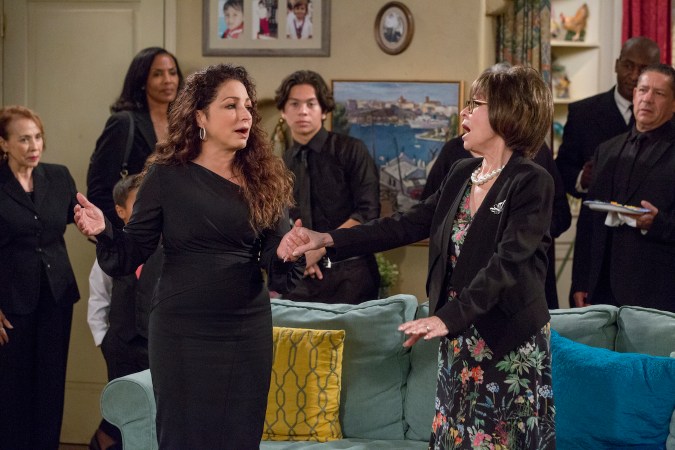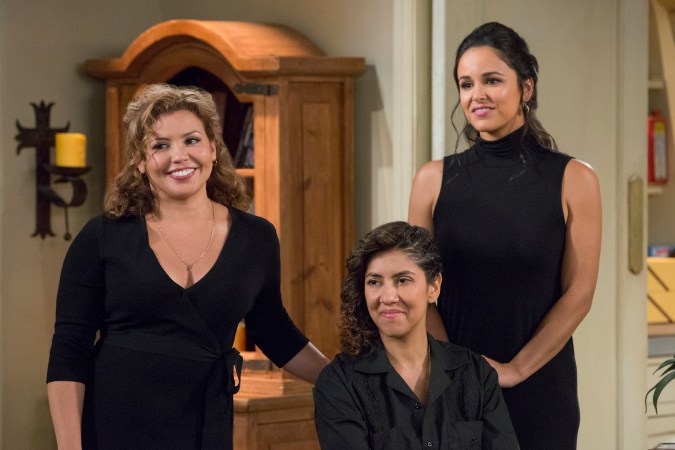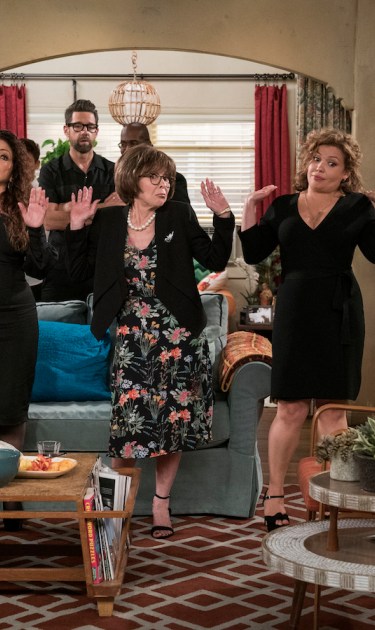One Day at a Time has always been, at its core, a story about coping: coping as a family, coping as an individual, coping as a community, coping as people living downstairs from a super who insists on inviting himself over during pivotal private moments. The show’s third season digs deep into this theme with help from a string of familiar faces as guest stars, kicking off with a premiere episode that features Stephanie Beatriz and Melissa Fumero (both from Brooklyn-Nine-Nine) as family members, and Gloria Estefan (patron saint of el exilio) as Mirta, Lydia’s sister and long-time nemesis.
Throughout the episode, these new-to-us family members act like funhouse mirror versions of the Alvarez-Riera family. As Tía Pilar, Stephanie Beatriz offers Elena a model of lesbian adulthood worlds away from her own nascent, adolescent idea of being out and proud. Melissa Fumero’s Estrellita, a beloved cousin, acts as a reflection of Penelope’s past, with a little twist, as they reconnect in the present.
As for Nuestra Gloria, her role is less about acting as a multi-faceted foil to Lydia and more about kicking off the season by letting viewers enjoy the glory of Gloria being Gloria. And it works! Gloria’s meta appearance on the show (she does, after all, sing its theme song) also sets the tone for the season’s exploration of the ways patterns (and messy family dramas) repeat across generations.

In episode four, we meet Danny Pino (the handsome detective from Law & Order: SVU and the handsome drug cartel leader from Mayans M.C.) as Penelope’s handsome Cubanazo brother, Tito. As Lydia herself puts it: “I made that face with sex from your papi.” As a pampered and beloved mama’s boy happy with letting Penelope handle the family’s heavy lifting, Tito gives us a little more insight into the Riera family dynamics, mirrored in a b-story about Alex and Elena’s own struggles as siblings.
The theme of coping is seen once again in a story arc that centers on Penelope’s reaction to her ex-husband’s new fiancée. As Nicole (the “nickel” to Machado’s “Penny”), showrunner Gloria Calderon Kellett makes great use of the natural chemistry between her and Machado. The two women are veritable mirror images of one another, from their honey-colored curls to their identical laughs, like firecrackers going off at a pachanga. The casting works so well because it’s clear these women genuinely like one another, eschewing what would’ve been an easier and predictable old wife versus new wife storyline for something richer and more refreshing.

But the crown jewels of this third season are episodes seven and nine, which deal with themes of sex and anxiety, respectably. It’s fair to say that sexuality and mental health form such integral part of the season’s fabric that they’re essentially recurring guest stars in and of themselves. These episodes in particular showcase ODAAT’s ability to weave a story around a moral in a way that makes sense for the characters we’ve come to know across three seasons. While there’s always the risk of tender family comedies running headfirst into “very special episode” territory rife with the kind of pat, saccharine endings that saw Danny Tanner sitting at the edge of a bed to impart some homey wisdom, these episodes aren’t afraid to veer into the more awkward and uglier sides of coping.
Beyond heartwarming family moments or important lessons, these episodes work so well because they keep the focus tightly on the reality of suffering and struggling as a teen or the mother of a teen, of being a person who means well and wants to do better but doesn’t always feel equipped to do so. These episodes, in particular, acknowledge well-worn stereotypes – frantic mothers dealing poorly with dating teens, teens dabbling in drug use, everyone dealing with anxiety as its passed down across generations – without leaning into them. It’s refreshing to see a show about a Latinx family confronting mental illness, for instance, that subverts the expectation that Latinx families are fundamentally opposed to mental health care. This is where the multi-generational format baked into the show pays off so well: Penelope exists at a crossroads, dealing both with inherited ideas and coping mechanisms passed down from her old-school mom while wanting to provide a better model for her children.

Other notable guest stars to watch out for: marijuana lozenges (they’ll feature a couple of times) and, well. No spoilers, but you might see a certain An*y G*rc*a. Wink, wink.
One Day at a Time season three drops on Netflix February 8 at midnight PT and 3 a.m. ET.




